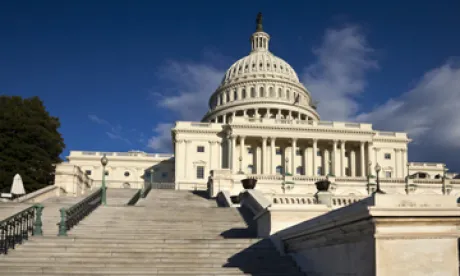Debates in Washington over expenditures associated with military-related bid protests are fueling new legislation that could curtail protest efforts. The Government Accountability Office (GAO) handles bid protests filed by entities challenging Department of Defense contract awards. Any bid protest filed by a disgruntled proposer that did not win a military contract is filed at the GAO, and the GAO’s budget is regulated by Congress because it is a part of the Department of Defense. In an effort to conserve finances and to minimize frivolous protests, both the House and Senate Armed Services Committees have begun inquiring into new legislation to curb expensive bid protests at the GAO.
The House Armed Services Committee (HASC) intends to employ an independent body to review the GAO bid protest process and to survey the duration of bid protests, specifically with regards to protests filed by incumbent contractors. Why the focus on incumbent contractors? The GAO employs an “automatic stay” upon filing a bid protest. The automatic stay forecloses the agency from finalizing a contract with the winning bidder until after the protest concludes. Thus, the automatic stay forces an agency to enter into interim contracts with the incumbent entity while the protest is ongoing. Some ponder whether, because of the automatic stay’s power, incumbent entities file bid protests to preserve a few more months of revenue, regardless of the merits of the protest.
The Senate Armed Services Committee (SASC) has released its bill which goes beyond studying the impact of bid protests. The SASC’s legislation targets “serial protestors” and attempts to place disincentives and incentives to limit such protests. There are three notable changes to existing GAO bid procedures in the SASC bill.
First, the SASC proposes to revise the GAO’s jurisdiction over task and delivery protests by simply taking away its jurisdiction to hear such cases. The SASC proposes to, instead, submit task and delivery protests to an ombudsman appointed by the Department of Defense. While this option exists today, it is hardly used because the process is unpredictable and the outcome is said to be subject to internal agency politics.
Second, in an effort to target “serial protestors,” the SASC has proposed to enforce the “English rule” which, traditionally, mandates that the loser pay all costs associated with the winner’s case. In this context, the provision would require large contractors to pay all costs incurred by the GAO for processing any protest where all of the elements of the protest are denied. This rule, however, assumes that all unsuccessful protests were filed frivolously. Moreover, it is not clear whether this provision would dissuade “serial protesters” as these protestors can utilize other avenues—like alternative dispute resolution or withdrawing protests before the issuance of an opinion—without having to pay fees for losing.
Finally, the SASC proposes to disincentivize frivolous protests filed by incumbent contractors that take advantage of the GAO’s automatic stay. Where an incumbent contractor’s protest results in the issuance of interim payments to itself, any payment issued in excess of actual costs incurred by the incumbent would be held in escrow pending the outcome of the protest. If the incumbent contractor is successful, the funds will be released to the incumbent. If the incumbent contractor is not successful, the withheld funds are released to the awardee of the protested contract. This provision, undoubtedly, raises numerous legal questions that will be ironed out when the House and Senate committees eventually come together to determine the final proposed language.
Of course, the President holds veto power over Congressional bills, and the President’s administration has already threatened to veto other provisions of legislation relating to the Department of Defense’s budget.




 />i
/>i
